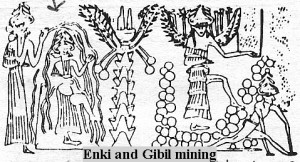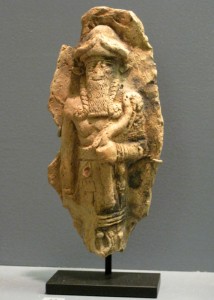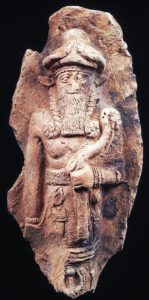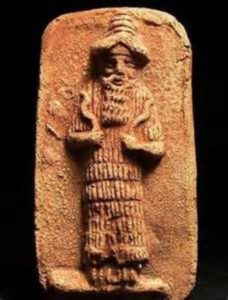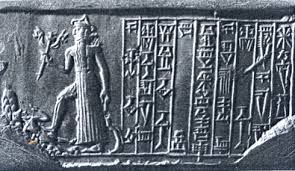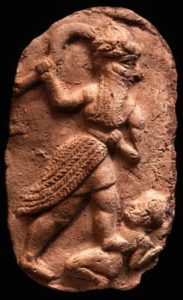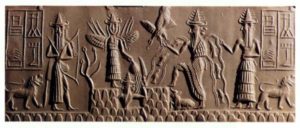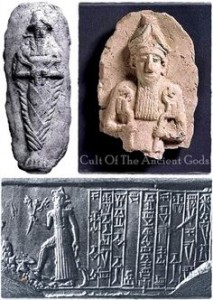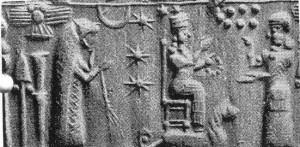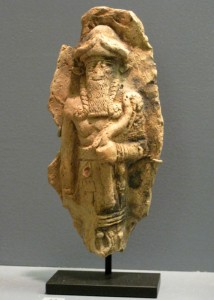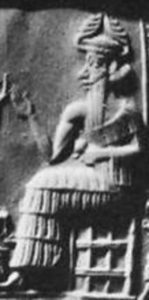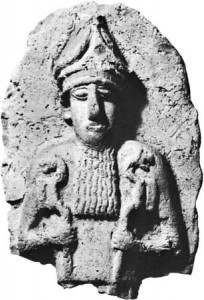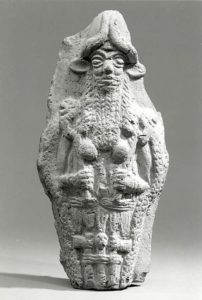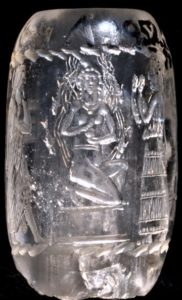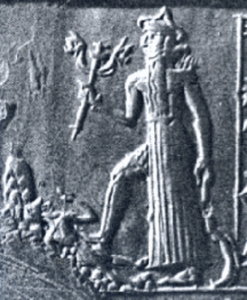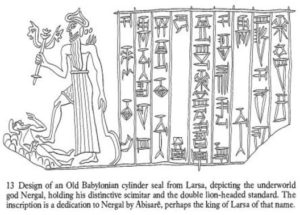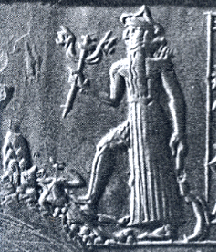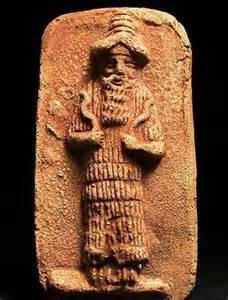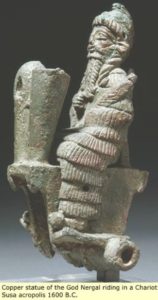SEE SITCHIN’S EARTH CHRONICLES, ETC.:
(Texts: All Artifacts, Color Coding, & Writings in Bold Type With Italics Inside Parenthesis, are Added by Editor R. Brown, not the Authors, Translators, or Publishers!)
(gods in blue …mixed-breed demigods in teal…)
“To Nergal, the Enlil of the nether world, in his palace,
the shepherd Ur-Namma offered a mace,
a large bow with quiver and arrows, an artfully made …… dagger,
and a multi-colored leather bag for wearing at the hip …”
The southernmost domain was granted to NER.GAL (“great Watcher”) and his spouse Ereshkigal.
“Mighty Erra (Nergal), who goes before his army,
Will shatter his front line and go at this enemy´s side …”
Some of Dumuzi’s brothers, not Marduk / Ra, blessed the nuptials as well. It’s not clear if Enki responded favorably. Dumuzi’s brothers hid for in the bedroom,
“a bed of gold, adorned with lapis lazuli, …”
a precious, blue-hued gem,
“which Gibil had refined for her in the abode of Nergal …”
Most dramatic phase of the Second Pyramid War…recalling the heroic feats of Nergal in this war, the text relates how, as the other gods found themselves hemmed in within the Giza complex, Nergal—
“Lofty Dragon Beloved of Ekur …”
“at night stole out …”
broke through the encirclement to reach the Great Pyramid (the Ekur). Reaching it at night, he entered through
“the locked doors which by themselves can open …”
A roar of welcome greeted him as he entered:
“Divine Nergal,
Lord who by night stole out, had come to the battle!
He cracks his whip, his weapons clank…
He who is welcome, his might is immense;
Like a dream at the doorstep he appeared.
Divine Nergal, the One Who Is Welcome:
Fight the enemy of Ekur (Enlil’s headquarters / house in Nippur),
lay hold on the Wild One from Nippur! …”
As Nergal joined the defenders of the Great Pyramid, he strengthened its defenses through the various ray-emitting crystals positioned within the pyramid:
“The Water-Stone, the Apex-Stone, the…Stone, the…
…the lord Nergal increased its strength.
The door for protection he…
To heaven its Eye he raised,
Dug deep that which gives life…
…in the House he fed them food. …”
Unable or unwilling to remove Marduk by force, the Anunnaki turned to Marduk’s brother Nergal and asked him to
“scare Marduk off the divine seat …” (in Babylon).
A text named by scholars “The Erra Epos”, for in it Nergal is called… ER.RA…a derogatory epithet,…”The Servant of Ra.”…better called “The Tale of the Sins of Nergal” for it puts the blame on Nergal for a chain of events with a catastrophic ending…
“into the Esagil, temple of Heaven and Earth, he entered and stood before Marduk ...”
Marduk explained that he had to take matters in his own hands:
“In the aftermath of the Deluge, the decrees of Heaven and Earth had gone astray.
The cities of the gods upon the wide Earth were changed around;
They were not brought back to their locations…
As I survey them again, of the evil I am disgusted;
Without a return to their (original) places,
Mankind’s existence is diminished…
Rebuild I must my residence which in the Deluge was wiped away;
Its name (I must) call again …”
…failures on the part of Erra himself to account for certain divine artifacts–
“the instrument of giving orders, the Oracle of the gods;
the sign of kingship, the Holy Scepter which contributes brilliance to Lordship…
Where is the Holy Radiating Stone which disintegrates all? …”
If he were forced to leave, Marduk said,
“on the day I step off my seat, the flooding shall from its well cease to work…
the waters shall not rise… the bright day to darkness (shall return)…
confusion shall arise… the winds of drought shall howl… sickness shall spread …”
After some more exchanges Erra offered to return to Marduk
“the artifacts of Heaven and Earth …”
He assured Marduk there was nothing to worry about: he (Erra) would enter Marduk’s house only to
“erect the Bulls of Anu and Enlil at thy gate …”
statues of winged bulls as were actually found at temple sites…
“Marduk heard this;
The promise, given by Erra, found his favor.
So did he step down from his seat,
and to the Land of Mines, abode of the Anunnaki, he set his direction …”
Marduk agreed to leave Babylon. But no sooner he had done that than Nergal broke his word. Nergal / Erra ventured into the Gigunu, the mysterious underground chamber…and there Erra caused its “Brilliance” to be removed…as Marduk had warned,
“the day turned into darkness, flooding was disarrayed,
the lands were laid to waste, the people were made to perish …”
“With anger (at Erra) they were filled …”
Erra’s father, reproached him:
“Now that the Prince Marduk had stepped off, what have you done? …”
“,Go away! …’
he ordered Erra.
‘Take off to where no gods ever go! …’
‘Erra lost his voice …’
‘As to my warriors, they shall not go back’ …”
“Kutheans who worshipped Nergal …”
The departure of Marduk from Babylon brought an end Ishtar’s conflict with him.; the rift between Marduk and Nergal…created an alliance between Ishtar and Nergal.
…verses in the Babylonian text…have a direct parallel in the biblical tale of the destruction of Sodom and Gomorrah:
“But when the son of Marduk in the land of the coast was,
He-of-the-Evil-Wind (Erra) with heat the plain-land burnt …”
“He (Nabu) the great sea entered,
Sat upon a throne which was not his
(Because) Ezida, the legitimate abode, was overrun …”
Enki stood by his firstborn son:
“Now that Prince Marduk has arisen,
now that the people for the second time have raised his image,
why does Erra continue his opposition? …”
Finally, loosing his patience, Enki shouted at Nergal to get out of his presence. Leaving in a huff, Nergal returned to his domain. “Consulting with himself,” he decided to unleash the awesome weapons:
“The lands I will destroy, to a deep dust-heap make them;
the cities I will upheaval, to desolation turn them;
the mountains I will flatten, their animals make disappear;
the seas I will agitate, that which teems in them I will decimate;
the people I will make vanish, their souls shall turn to vapor; none shall be spared. …”
We learn from a text…that it was Gibil, whose domain in Africa adjoined that of Nergal, who alerted Marduk to the destructive scheme hatched by Nergal…It was then that Gibil “these words to Marduk did speak” in regard to the
“seven awesome weapons which Anu created..
The wickedness of those seven against thee is being laid, …”
he informed Marduk. Marduk inquired of Gibil where the awesome weapons were kept. “O Gibil,,” he said, “those seven—where were they born, where were they created?” To which Gibil revealed that they were hidden underground:
“Those seven, in the mountain they abide, in a cavity inside the earth they dwell.
From this place with a brilliance they will rush forth,
From Earth to Heaven, clad with terror …”
But where exactly is this place? Marduk asked again and again; and all Gibil could say was that “even the wise gods, to them it is unknown.”
Now Marduk rushed to his father Enki with the frightening report.
“To his father Enki’s house he (Marduk) entered …”
Enki was lying on the couch in the chamber to which he retired for the night. “My father” Marduk said,
“Gibil this word hath spoken to me:
of the coming of the seven (weapons) he has found out …”
Telling his father the bad news, he urged his all-knowing father:
“Their place to search out, do hasten thou! …”
Enki spoke out strongly against the idea, urging steps to stop Nergal, for the use of the weapons, he pointed out,
“the lands will make desolate, the people will make perish. …”
Nannar and Utu wavered as Enki spoke, but Enlil and Ninurta were for decisive action. And so with the Council of the Gods was in disarray, the decision was left to Anu.
Nergal had already ordered the priming of “the seven awesome weapons” with their “poisons.”,
“Anu, lord of the gods, on the land had pity …”
It was then that Ninurta, attempting to dissuade Nergal from indiscriminate annihilation, used words identical to those attributed in the Bible to Abraham when he tried to have Sodom spared:
“Valiant Era (Nergal),
Will you the righteous destroy with the unrighteous?
Will you destroy those who have against you sinned
together with those who against you have not sinned? …”
The two gods argued back and forth on the extent of the destruction. More than Ninurta, Nergal was consumed by personal hatred:..he shouted
“I shall annihilate the son (Nabu), and let the father (Marduk) bury him;
then I shall kill the father, let no one bury him …”
Ninurta finally swayed Nergal.
“He heard the words spoken by Ishum (Ninurta); the words appealed to him as fine oil …”
Agreeing to leave alone the seas, to leave Mesopotamia out of the attack, he formulated a modified plan: the destruction will be selective..to destroy the cities where Nabu might be hiding…to deny Marduk the greatest prize—the Spaceport,
“the place from where the Great Ones ascend …”:
“From city to city an emissary I will send;
The son, seed of his father, shall not escape;
His mother shall cease her laughter…
To the place of the gods, access he shall not have:
The place from where the Great Ones ascend I shall upheaval …”
Wasting no more time, Nergal then urged Ninurta that the two of them go at once into action:
“Then did the hero Erra go ahead of Ishum, remembering his words;
Ishum too went forth, in accordance with the word given, a squeezing in his heart …”
Their first target was the Spaceport, its command complex hidden in the “Mount Most Supreme,” its landing fields spread in the adjoining great plain:
“Ishum to Mount Most Supreme set his course;
The Awesome Seven, (weapons) without parallel, trailed behind him.
At the Mount Most Supreme the hero arrived;
He raised his hand– the mount was smashed;
The plain by the Mount Most Supreme he then obliterated;
in its forests not a tree-stem was left standing …”
So with one nuclear blow the Spaceport was obliterated…Now it was the turn of Nergal…Guiding himself through the Sinai peninsula to the Canaanite cities by folllowing the King’s Highway, Erra upheavaled them.
The words employed by the “Erra Epic” are almost identical to those used in the biblical tale of Sodom and Gomorrah:
“Then, emulating Ishum, Erra the King’s Highway followed.
The cities he finished off, to desolation he overturned them.
In the mountains he caused starvation, their animals he made perish …”
The verses that follow may well describe the creation of the new southern portion of the Dead Sea…:
“He dug through the sea, its wholeness he divided.
That which lives in it, even the crocodiles he made wither.
As with fire he scorched the animals, banned its grains to become as dust …”
We find descriptions and recollections of the nuclear upheaval in other texts as well:
“Lord, bearer of the Scorcher that burnt up the adversary;
Who obliterated the disobedient land;
Who withered the life of the Evil Word’s followers;
Who raised stones and fire upon the adversaries …”
In a Babylonian text in which one king recalls the momentous events that had taken place “in the reign of an earlier king.”
“At that time, in the reign of a previous king, conditions changed.
Good departed, suffering was regular.
The Lord (of the gods) became enraged, he conceived wrath.
He gave the command: the gods of that place abandoned it…
The two, incited to commit the evil, made its guardians stand aside;
its protectors went up to the dome of heaven …”
The “Khedorlaomer Text”, which identifies the two gods by their epithets as Nergal and Ninurta, tells it this way:
“Enlil, who sat alone in loftiness, was consumed with anger.
The devastators again suggested evil;
He who scorches with fire (Ishum / Ninurta) and he of the evil wind (Erra / Nergal)
together performed their evil.
The two made the gods flee, made them flee the scorching …”
The target, from which they made the gods guarding it flee, was the Place of the Launching:
“That which was raised towards Anu to launch they caused to wither;
Its face they made fade away, its place they made desolate …”
Thus was the Spaceport, the prize of which so many Wars of the Gods had been fought, obliterated: the Mount within which the controlling equipment was placed was smashed; the launch platforms were made to fade off the face of the earth; and the plain whose hard soil the shuttle craft had used as runways was obliterated, and not even a tree left standing.
But the deed done by Nergal and Ninurta had not gone unrecorded, for it turned out to have a most profound effect on Sumer, its people, and its very existence…The nuclear explosion gave rise to an immense wind, a radioactive wind, which began as a whirlwind:
“A storm, the Evil Wind, went around in the skies …”
The desolation caused by the catastrophe is then described vividly, by such verses as these:
“Causing cities to be desolate, (causing) houses to become desolate;
Causing stalls to be desolate, the sheepfolds to be emptied;
That Sumer’s oxen no longer stand in their stalls, that its sheep no longer roam in its sheepfolds;
That its rivers flow with water that is bitter, that its cultivated fields grow weeds,
that its steeps grow withering plants …”
In the cities and the hamlets,
“the mother cares not for her children, the father says not ‘O my wife’…
the young child grows not sturdy on their knee, the nursemaid chants not a lullaby…
kingship has been taken away from the land …”
“On the Land (Sumer) fell a calamity, one unknown to man:
One that had never been seen before, one which could not be withstood …”
It was an unseen death,
“which roams the street, is let loose in the road;
it stands beside a man– yet none can see it;
when it enters a house, its appearance is unknown …”
There was no defense against this
“evil which has assailed the land like a ghost:…
The highest wall, the thickest walls, it passes as a flood,
no door can shut it out, no bolt can turn it back;
through the door like a snake it glides, through the hinge like a wind it blows in.
Cough and phlegm weakened the chest, the mouth was filled with spittle and foam…
dumbness and daze have come upon them, an unwholesome numbness…
an evil curse, a headache… their spirit abandoned their bodies …”
it was a most gruesome death:
“The people, terrified, could hardly breathe; the Evil Wind clutched them, does not grant them another day…
Mouths were drenched in blood, heads wallowed in blood…
The face was made pale by the Evil Wind …”
“Covered the land as a cloak, spread over it like a sheet …”
Brownish in color, during the daytime
“the sun in the horizon it obliterated with darkness …”
“Girt with dread brilliance it filleth the broad earth”
it blocked out the moon:
“the moon at its rising it extinguished …”
Moving from west to east, the deadly cloud–
“enveloped in terror, casting fear everywhere a great wind which speeds high above,
an evil wind which overwhelms the land …”
It was
“a great storm directed from Anu… it hath come from the heart of Enlil.
In a single spawning it was spawned… like the bitter venom of the gods; in the west it was spawned.
Bearing gloom from city to city, carrying dense clouds that bring gloom from the sky …”
was the result of a
“lightning flash, from the midst of the mountains it had descended upon the land,
From the Plain of No Pity it hath come …”
Though the people were baffled, the gods knew the cause of the Evil Wind:
“An evil blast heralded the baleful storm,
An evil blast the forerunner of the baleful storm was;
Mighty offspring, valiant sons were the heralds of the pestilence …”
As soon as the “awesome weapons” were launched from the skies, there was an immense brilliance
“they spread awesome rays towards the four points of the earth, scorching everything like fire …”
“The storm, in a flash of lightning created, a dense cloud that brings gloom. …”
followed by
“rushing wind gusts… a tempest that furiously scorches the heavens …”
Several texts attest that the Evil Wind, bearing the cloud of death, was caused by gigantic explosions on a day to remember:
“On that day
When heaven was crushed and the Earth was smitten, its face obliterated by the maelstrom–
When the skies were darkened and covered as with a shadow …”
Over Sumer, its passage lasting twenty-four hours—a day and a night…as in this…from Nippur:
“On that day,, on that single day; on that night, on that single night…
the storm, in a flash of lightning created, the people of Nippur left prostrate …”
The Uruk lament
“The great gods paled at its immensity, gigantic rays reach up to heaven (and) the earth tremble to its core …”
As the Evil Wind began to “spread to the mountains as a net,” the gods of Sumer began to flee their beloved cities…Thus
“Ninhursag wept in bitter tears …”
as she escaped from Isin. Nanshe cried,
“’O my devastated city…’ her beloved dwelling place was given over to misfortune …”
Inanna hurriedly departed from Uruk, sailing off toward Africa in a “submersible ship” and complaining that she had to leave behind her jewelry and other possessions…Inanna / Ishtar bewailed the desolation of her city and her temple by the Evil Wind
“which in an instant, in a blink of an eye was created against the midst of the mountains, …”
and against which there was no defense…As the
“loyal citizens of Uruk were seized with terror. ..”
“Rise up! Hide in the steppe! ..”
“the deities ran off… they took unfamiliar paths …”
“Thus all the gods evacuated Uruk;
They kept away from it;
They hid in the mountains,
They escaped to the distant plains …”
In Uruk…
“Mob panic was brought about in Uruk…. its good sense was distorted …”
…as the people asked questions:
“Why did the gods benevolent eye look away?
Who caused such worry and lamentation? …”
When the Evil Storm passed over,
“the people were piled up in heaps… a hush settled over Uruk like a cloak …”
Ninki, we learn from “The Eridu Lament”, flew away from her city to a safe haven in Africa:
“Ninki, its great lady, flying like a bird, left her city …”
But Enki left Eridu only far enough to get out of the Evil Wind’s way, yet near enough to see its fate:
“Its lord stayed outside the city…
Father Enki stayed outside the city… for the fate of his harmed city he wept with bitter tears …”
They watched the storm “put its hand” on Eridu. After the
“evil-bearing storm went out of the city, sweeping across the countryside, …”
Enki surveyed Eridu; he found the city
“smothered with silence… its residents stacked up in heaps …”
Those who were saved addressed to him a lament:
“O Enki, thy city has been cursed, made like an alien territory! …”
…and Enki
“stayed out of his city as though it were an alien city. …”
“Forsaking the House of Eridu, …”
Enki then led
“those who have been displaced from Eridu …”
to the desert, “towards an inimical land”; there he used his scientific powers to make the “foul tree” edible.
From Babylon, a worried Marduk sent his father, Enki, an urgent message as the cloud of death neared his city:
“What am I to do? …”
he asked Enki’s advice…and in line with the advice given by the two emissaries to Lot, the people fleeing Babylon were warned
“neither to run nor to look back …”
They were also told not to take with them any food or beverage, for these might have been “touched by the ghost.”
“Get thee into a chamber below the earth, into a darkness, …”
until the Evil Wind was gone…In Lagash,
“mother Bau wept bitterly for her holy temple, for her city …”
Though Ninurta was gone, his spouse could not force herself to leave. Lingering behind, “O my city, O my city,” she kept crying; the delay almost cost her her life:
“On that day, the lady– the storm caught up with her;
Bau, as if she were mortal– the storm caught up with her …”
In Ur we learn from the lamentations (one of which was composed by Ningal herself) that Nannar and Ningal refused to believe that the end of Ur was irrevocable. Nannar addressed a long and emotional appeal to his father…
“Ur was granted kingship– it was not granted an eternal reign.
Since days of yore, when Sumer was founded, to the present, when people have multiplied–
Who has ever seen a kingship of everlasting reign? …”
While the appeals were made, Ningal recalled in her long poem,
“the storm was ever breaking forward, its howling overpowering all.
Although of the day I still tremble, of that day’s foul smell we did not flee …”
As night came, “a bitter lament was raised” in Ur, yet the god and goddess stayed on…and Ningal realized that Nannar
“had been overtaken by the evil storm …”
…Only next day, when
“the storm was carried off from the city Ningal, in order to go from her city… hastily put on a garment, …”
and together with the stricken Nannar departed from the city they so loved. As they were leaving they saw death and desolation:
“the people, like potsherds, filled the city’s streets;
in its lofty gates, where they were wont to promenade, dead bodies were laying about;
in its boulevards, where the feasts were celebrated, scattered they lay; in all of its streets,
where they were wont to promenade, dead bodies were laying about;
in its places where the land’s festivities took place, the people lay in heaps.
The dead bodies, like fat placed in the sun, of themselves melted away …”
Then did Ningal raise her lamentation for Ur…
“O house of Sin in Ur, bitter is thy desolation…
O Ningal whose land has perished, make thy heart like water!
The city has become a strange city, how can one now exist?
The house has become a house of tears, it makes my heart like water…
Ur and its temples have been given over to the wind …”
“On the banks of the Tigris and Euphrates, only sickly plants grew…
In the swamps grow sickly-headed reeds that rot in the stench…
In the orchards and gardens there is no new growth, quickly they waste away…
The cultivated fields are not hied, no seeds are planted in the soil, no songs resound in the fields …”
In the countryside the animals were also affected:
“On the steppe, cattle large and small became scarce, all living creatures came to an end.
The sheepfolds have been delivered to the wind…
The hum of the turning churn resounds not in the sheepfold…
The stalls provide not fat and cheese… Ninurta has emptied Sumer of milk …”
“The storm crushed the land, wiped out everything;
it roared like a great wind over the land, none could escape it; desolating the cities, desolating the houses…
No one treads the highways, no one seeks out the roads …”
The desolation of Sumer was complete.
One text states, “The Legend of Naram-Sin”
“Although since the time of separation of mankind none of the kings have ever destroyed Arman and Ibla,
the god Nergal did open up the path for the mighty Naram-Sin and gave him Arman and Ibla.
He also gave him as a present Amanus, the Cedar Mountain, to the Upper-Sea …”
“Ea from his abyss deep heard Gilgamesh and took pity then said:
‘Nergel, hear me now, open a most wide hole in your roof
From whence can Enkidu waft like smoke up from your hot fires below.’
Nergel heard Ea’s great voice and did cut a hole in his roof
To let Enkidu’s spirit waft up from his hot fires below.
Enkidu’s spirit did waft up …”
The recognition by Naram-Sin of Nergal’s power and influence well beyond Africa…
“Although since the era of the rulership of man
none of the kings ever destroyed Arman and Ebla,
Now did the god Nergal open up the path for the mighty Naram-Sin.
He gave him Arma and Ebla, presented him with the Amanus
and with the Cedar Mountain and with the Upper Sea …”
